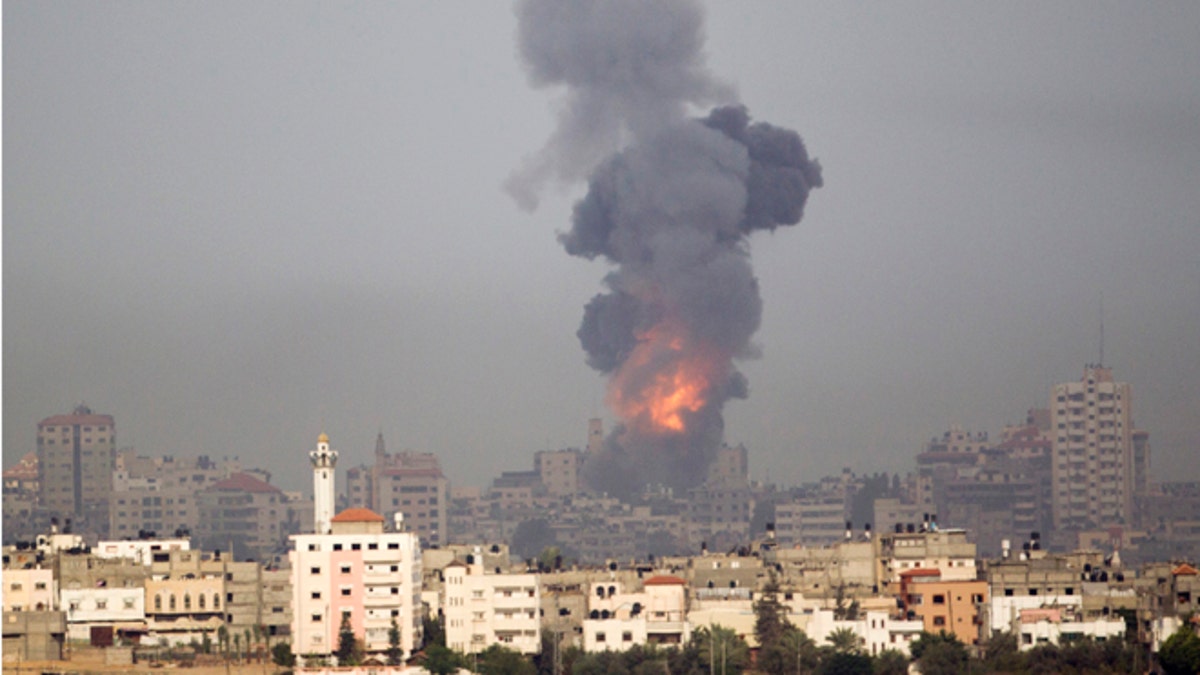
Nov. 17, 2012: Explosion and smoke rise following an Israeli strike in Gaza, seen from the Israel Gaza Border, southern Israel. (AP)
HAIFA, Israel – Hundreds of Iranian-made, long-range missiles already smuggled into Gaza provided a secret sense of urgency behind Israel's recent campaign against Hamas, and the the Jewish state acted with the Obama administration's full knowledge, intelligence experts told FoxNews.com.
Jonathan Schanzer, a former counter-terrorism analyst at the U.S. Department of the Treasury, said the real agenda behind Israel’s assault last month on Hamas’ munitions stockpiles and smuggling tunnels was not simply to end the daily barrage of relatively primitive rockets that have become part of daily life in Israel. The real mission was to eliminate as many as 100 Iranian-built Fajr5 missiles - with the power to reach Tel Aviv - that had been sneaked into Gaza through Egypt. The Obama administration knew in advance of the operation and agreed that the missiles, built in a Sudanese factory, had to be neutralized to protect millions of Israeli citizens who were now within range of the deadly Iranian weapons, according to Schanzer.
“The U.S. was fully aware of what was going to come in Gaza,” Schanzer, now vice president of research at the Foundation for the Defense of Democracies, told FoxNews.com. “They said nothing for the first few days of the operation; there was dead silence from [Obama]."
Israel essentially achieved its main aims within the first few days, said Schanzer, noting that Michael Oren, Israel’s ambassador to the U.S., said as much when he remarked on Day Three of the campaign: "We have run out of good targets.”
Rocket attacks from Gaza were commonplace in Israel prior to the campaign, dubbed "Operation Pillar of Defense," with at least 750 projectiles falling on the area close to the border since January. The attacks were ratcheted up in early November, which seemed to prompt Israel's move and the deployment of its vaunted "Iron Dome" defense system. But behind the scenes, the Israel Defense Force (IDF) had a more pressing need to launch their intense bombardment on Hamas’ weapons stores.
Israel's elimination of senior Hamas figure Ahmad Jabari as he drove in broad daylight in Gaza also fits into Schanzer's narrative.
“Ahmad Jabari, along with another major Hamas figure, Mahmoud al Mabhouhk, [who was assassinated in Dubai in 2010], was a key part of the procurement network for the Fajr missiles and there is little doubt that Israel was keen to take out the man responsible,” Schanzer explained.
Schanzer contends that the operation actually began three weeks earlier, when, on Oct. 23, the Iranian-owned Yarmouk armaments factory in Sudan - believed to be the assembly plant for the Fajr5 missiles that have a range of up to 45 miles - was devastated by air strikes for which the Sudanese government holds Israel responsible. Israel, and for that matter the U.S., both deny any knowledge of the attack.
Sudanese Information Minister Ahmad Bilal Osman, told Al Jazeera the day after the attack, “Israel has accused Sudan of sending arms to Hamas. These allegations are not correct. The factory manufactures ordinary, legal weapons.”
When asked how Sudan would respond to the incident, Osman answered, “We definitely won’t attack Israel itself…but we have a right to tackle the interests of Israel wherever they are from now on.”
It may not have been coincidental that the destruction of the Sudanese factory occurred at exactly the same time that a joint Israeli/U.S. military exercise, ‘Austere Challenge’, involving some 3,500 U.S. troops, was taking place in Israel. Some military analysts have suggested that the exercises and the Gaza operation were part of a dry run for a potential future incursion into Iran.
The suggestion of American knowledge and approval of the alleged Israeli attack in Sudan and the subsequent offensive in Gaza, undermines the theory that Obama and Israeli Prime Minister Benjamin Netanyahu were not on speaking terms after the elections, in which Netanyahu expressed support for Mitt Romney. The grave threat posed by the Fajr5 rockets may have been enough for both leaders to agree that something had to be done – and fast.
“The fact of the matter is that there was a significant upsurge in rocket fire from Gaza in the weeks leading up to the operation," an Israeli administration source told FoxNews.com. "Once the need to respond was there, it made sense to take the opportunity to act against the most dangerous weapons. Those (the Fajr rockets) were the first targets. There was a need to minimize their ability to target major population centers in Israel.”
The apparent coordination between Israel and the U.S. raises questions about the role of Egypt, which was credited with helping broker a cease fire between Israel and Hamas. The missiles were almost certainly smuggled into Gaza from Egypt, with the likely knowledge of President Morsi, whose Muslim Brotherhood is the parent organization of Hamas.
“There’s little doubt that Iranian-built rockets came from Sudan through Egypt, and that Egypt’s security forces weren’t interested in intercepting the missiles," Eric Trager, of the Washington Institute, an expert on Egyptian affairs, told FoxNews.com. "Morsi was more interested in furthering his own internal agenda than worrying about foreign policy issues at that time.”
Had Israel not acted when it did to destroy Hamas’ new and more lethal stockpile of weapons, the situation could have escalated, drawing other parties into a wider Middle East war.
“I think that Washington and the international media have been so lazy in their coverage of this conflict in terms of identifying what actually happened,” Schanzer said. “Both the Israeli intelligence community and Israeli officials referred to the presence of Fajr5 missiles in the hands of Hamas as 'game changing rockets,' a change that very nearly produced Israel’s own Cuban missile crisis.”
Paul Alster is an Israel-based journalist who blogs at www.paulalster.com and can be followed on Twitter @paulalster
